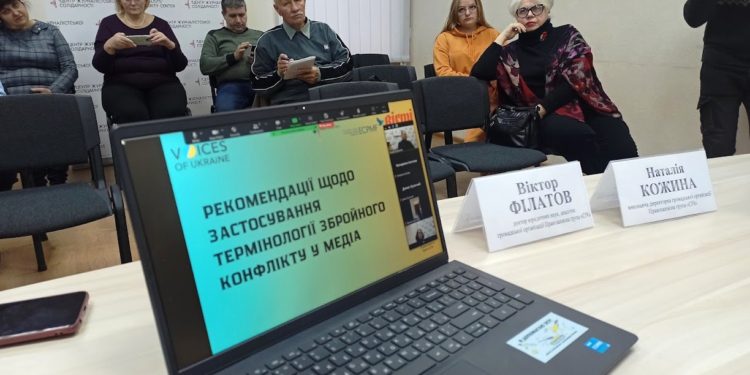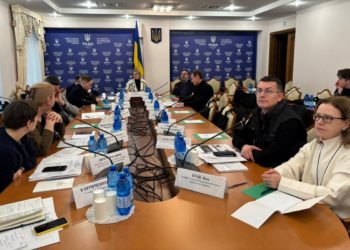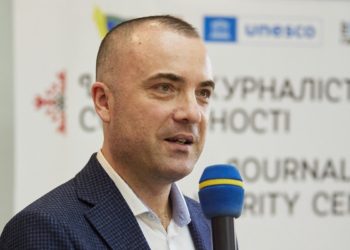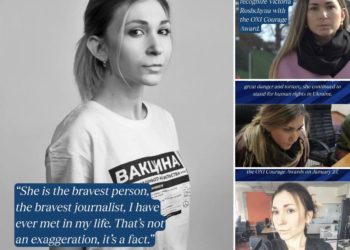The armed conflict, which has been going on in Ukraine for the third year, is changing not only people’s lives but also the approach to covering events in the media. How can journalists correctly write about war crimes? What terminology should be used in materials to determine the legal status of victims? What typical mistakes should be avoided? The participants of the training called Recommendations For The Use Of Armed Conflict Terminology In The Media, which was recently held at the Dnipro Journalists’ Solidarity Center of the National Union of Journalists of Ukraine (NUJU) received the answers to these and other questions.
Experts from the Human Rights Group SICH non-governmental organization, Viktor Filatov, and Nataliya Kozhyna, provided journalists with professional explanations and recommendations.
For many millennia, society has not been able to achieve the absence of armed conflicts at all. The international community, realizing that it is completely impossible to avoid armed confrontations, is directing efforts to their settlement and regulation. For this purpose, the laws of warfare, norms of international humanitarian law, international criminal law, etc. have been created, which regulate all aspects in detail, including terminology. Its correct application is of great importance since the understanding and perception of information at the international level depend on it.
In order to find out exactly how to cover war crimes, the participants, together with the speakers, discussed the concepts of war crimes, as well as cruel treatment, torture, crimes against humanity, etc.
During the training, the topic of prisoners of war was also discussed in journalistic materials, in particular, the situation with civilians who, starting in 2014, have become victims of illegal actions by the aggressor state despite the norms of international law.
Journalists must not only use terminology that is understandable to the world but also understand the words and terms used in international practice. The audience was very interested in the question of the legal classification of the russian-Ukrainian war. As Viktor Filatov explained, in international law, it is now customary to use the terms “armed aggression” or “armed conflict.”
Special attention was paid to advice on how to avoid ethical traps when covering conflict topics.
The experts emphasized that one should not create materials aimed at hype or sensation, as this may harm the victims and their families. Moreover, they discussed the need to refrain from disseminating sensitive information, the disclosure of which poses a danger to people; to pay attention to the psychological state of the people – the heroes of the materials and, in general, to adhere to the principle of “do no harm.”
Summing up the issues discussed, the experts advised using the Memorandum On The Procedure For Correctly Determining The Legal Status Of Civilians In Russian Captivity (https://sich-pravo.org/khroniky-vijny-status-tsyvilnykh-u-rosijskij-nevoli/), developed by the Human Rights Group SICH non-governmental organization together with other legal organizations, which contains a correct glossary of terms for covering war crimes, the topic of prisoners, etc.
Call the Dnipro JSC by dialing 050 919 8479 (JSC coordinator Nataliya Nazarova). The Center’s address is 8 Starokozatska Street.
ABOUT JSC
The Journalists’ Solidarity Centers is an initiative of the NUJU implemented with the support of the International and European Federations of Journalists and UNESCO. The initiative is designated to help media representatives working in Ukraine during the war. The Centers operate in Kyiv, Lviv, Ivano-Frankivsk, Chernivtsi, Zaporizhzhia, and Dnipro and provide journalists with organizational, technical, legal, psychological, and other types of assistance.
ABOUT UNESCO
UNESCO is the United Nations Educational, Scientific, and Cultural Organization. It contributes to peace and security by promoting international cooperation in education, sciences, culture, communication, and information. UNESCO promotes knowledge sharing and the free flow of ideas to accelerate mutual understanding. It is the coordinator of the UN Action Plan on the Safety of Journalists and the Issue of Impunity, which aims to create a free and safe environment for journalists and media workers, thus strengthening peace, democracy, and sustainable development worldwide. UNESCO is working closely with its partner organizations in Ukraine to provide support to journalists on the ground.
The designations employed and the presentation of material throughout this digest do not imply the expression of any opinion whatsoever on the part of UNESCO concerning the legal status of any country, territory, city, or area or its authorities or concerning the delimitation of its frontiers or boundaries.
The authors are responsible for the choice and the presentation of the facts contained in this digest and for the opinions expressed therein, which are not necessarily those of UNESCO and do not commit to the organization.
Dnipro JSC information service

 THE NATIONAL UNION OF
JOURNALISTS OF UKRAINE
THE NATIONAL UNION OF
JOURNALISTS OF UKRAINE
















Discussion about this post